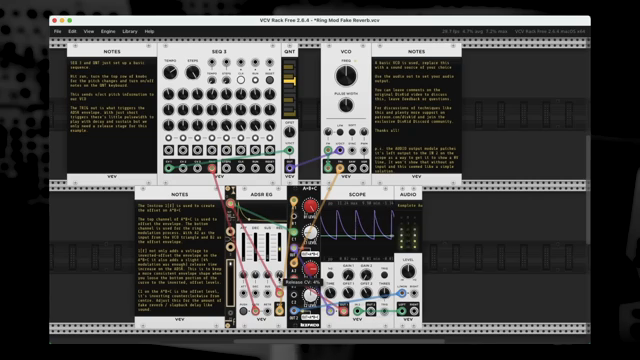Ever wondered if you could conjure the warmth of reverb without shelling out for some fancy pedal? You’re in for a treat as DivKid, the maestro of modular mayhem, takes us on a sonic escapade. This time, he’s resurrecting Rob Hordijk’s iconic ‘Poor Man’s Delay’ trick with a clever twist of ring modulation. Get ready to see familiar modules like Instruo VinCA, AtoV Project cLFO, Nekyia Circuits Ouija, and Befaco A*B+C turn into unlikely heroes of reverb emulation. Strap in for a synthesis journey that flips convention on its head!

20. May 2025
JET
DivKid Delivers Bleeps on a Punkish Plate
AtoV Project cLFO, Befaco A*B+C, Instruo VinCA, Manic, Nekyia Circuits Ouija
Unveiling the Magic of Ring Modulation
DivKid begins by introducing us to the concept of using ring modulation as a means to emulate reverb. This isn’t just any garden-variety trick – it’s a nod to Rob Hordijk’s legendary “Poor Man’s Delay.” The idea was recently referenced by Chris from Moog, generating ample curiosity. Now, DivKid brings it full circle, presenting this technique with his signature flair. He recalls an event from 2017 where Rob Hordijk himself showcased this method, illuminating the potential of psychoacoustic effects.
The Anatomy of Hordijk's Technique
In an extended exploration, DivKid delves into the specifics of Rob Hordijk’s clever use of ring modulators. He breaks down the process where ring modulators are employed akin to VCAs, achieving a faux echo effect. It’s truly a mind-bending trick that exploits psychoacoustics to its fullest. DivKid explains how an envelope, when modulated in an inverted phase, results in our brain perceiving subsequent sounds as coming from different directions. This, of course, isn’t all instantly clear, and Hordijk himself cheekily dubbed it a ‘poor man’s delay.’ Under the hood, it’s all about syncing the envelope to manipulate phase inversion, thereby fooling our ears into hearing a non-existent reverb.

"“The reason why that happens is, because I now basically sync my envelope a little bit through silence.”"
Building the Sonic Illusion
After laying the theoretical groundwork, DivKid ramps up the action. He rolls up his sleeves and constructs a patch, demonstrating the recipe for achieving this auditory illusion. The necessities include a trusty oscillator, a well-behaved triangle wave, and a ring modulator that can handle negative offsets. With Manic as the main module button, DivKid meticulously walks us through the process. He sets up a sequence, manipulates the bipolar VCA, and voilà – a fake reverb that thrives on psychoacoustics.
Module Mayhem: Experimenting Across Platforms

"“Let's patch this with some other modules, it isn't specific to Manic.”"
This section is an elaborate journey through various modules as DivKid extends the technique beyond Manic. With the same enthusiasm of a punk rocker diving off stage, he applies the technique to the Instruo VinCA, AtoV Project cLFO, Nekyia Circuits Ouija, and Befaco A*B+C. Each module presents its charm while adhering to the core principles of ring modulation trickery. DivKid shares his insights on how varying configurations and offsets can lead to intriguing results. But the essence remains unchanged – creating a ‘poor man’s delay’ using ring modulation is as satisfying as discovering a secret menu item at your local chippy. These explorations emphasize that while each module might flavour the sound differently, the core magic remains delightfully constant.
VCV Rack and Free Goodies
To wrap things up, DivKid generously offers a slice of downloadable goodness with VCV Rack patches. He shows how to implement the technique digitally, ensuring that the method is accessible even to those who prefer the virtual realm. There’s even a PDF to further dive into the details and ensure no stone is unturned. By providing these resources, DivKid empowers the community to revel in this technique, yet again proving that the world of synthesis, much like a punk gig, is open to those willing to get a bit chaotic and experimental.

"“Here's VCV Rack and here's a free version you can download.”"
Latest articles
Watch on YouTube:
https://www.youtube.com/DivKid
Links from DivKid:
Sponsored links:
If you purchase via these links, we may earn a small commission – at no extra cost to you.
🔗 Check price on Amazon